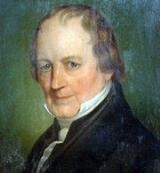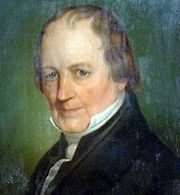
Friedrich Adolf Krummacher
Encyclopedia

Germany
Germany , officially the Federal Republic of Germany , is a federal parliamentary republic in Europe. The country consists of 16 states while the capital and largest city is Berlin. Germany covers an area of 357,021 km2 and has a largely temperate seasonal climate...
Reformed theologian. He was born at Tecklenburg
Tecklenburg
Tecklenburg is a town in the district of Steinfurt, in North Rhine-Westphalia, Germany.-Geography:It is located at the foothills of the Teutoburg Forest, southwest of Osnabrück.-Division of the town:...
, Westphalia
Westphalia
Westphalia is a region in Germany, centred on the cities of Arnsberg, Bielefeld, Dortmund, Minden and Münster.Westphalia is roughly the region between the rivers Rhine and Weser, located north and south of the Ruhr River. No exact definition of borders can be given, because the name "Westphalia"...
.
Having studied theology
Theology
Theology is the systematic and rational study of religion and its influences and of the nature of religious truths, or the learned profession acquired by completing specialized training in religious studies, usually at a university or school of divinity or seminary.-Definition:Augustine of Hippo...
at Lingen
Lingen
Lingen is a town in Lower Saxony, Germany. In 2008 the population was 52,353, and in addition there are about 5,000 people who have registered the city as their secondary residence...
and Halle
Halle, Saxony-Anhalt
Halle is the largest city in the German state of Saxony-Anhalt. It is also called Halle an der Saale in order to distinguish it from the town of Halle in North Rhine-Westphalia...
, he became successively rector of the grammar school at Moers
Moers
Moers is a German city on the left bank of the Rhine. Moers belongs to the district of Wesel...
(1793), professor of theology at Duisburg
Duisburg
- History :A legend recorded by Johannes Aventinus holds that Duisburg, was built by the eponymous Tuisto, mythical progenitor of Germans, ca. 2395 BC...
(1800), preacher at Krefeld
Krefeld
Krefeld , also known as Crefeld until 1929, is a city in North Rhine-Westphalia, Germany. It is located northwest of Düsseldorf, its centre lying just a few kilometres to the west of the River Rhine; the borough of Uerdingen is situated directly on the Rhine...
, and afterwards at Kettwig
Kettwig
Kettwig is the southernmost borough of the city of Essen in western Germany and, until 1975, was a town in its own right. Kettwig is situated next to the Ruhr river, at a median height of 53 metres above sea level. It is the most recently incorporated borough of Essen and also the largest in size,...
, Consistorialrath and superintendent in Bernburg
Bernburg
Bernburg is a town in Saxony-Anhalt, Germany, capital of the district of Salzlandkreis. It is situated on the river Saale, approx. 30 km downstream from Halle. The town is dominated by its huge Renaissance castle featuring a museum as well as a popular, recently updated bear pit in its...
, and, after declining an invitation to the University of Bonn
University of Bonn
The University of Bonn is a public research university located in Bonn, Germany. Founded in its present form in 1818, as the linear successor of earlier academic institutions, the University of Bonn is today one of the leading universities in Germany. The University of Bonn offers a large number...
, pastor of the Ansgariuskirche in Bremen (1824). He died at Bremen.
He was the author of many religious works, but is best known by his Parabeln (1805; 9th ed. 1876; Eng. trans. 1844). With Wilhelmina Koch
Wilhelmina Koch
Wilhelmina Amalie Koch was a German composer of sacred and secular song melodies, biblical motets and choral and instrumental music. She is one of only two women that have had compositions included in the Protestant hymnal.-Biography:Mina Koch was born in Waldböckelheim...
, he wrote the Protestant hymn "Stern, auf den ich schaue" (I look at the Star).
A. W. Moller published his life and letters in 1849.
Works
- Hymnus an die Liebe, 1801
- Parabeln, 3 vols, 1805–1817
- Über den Geist und die Form der evangelischen Geschichte in historischer und ästhetischer Hinsicht, 1805
- Die Kinderwelt, 1809
- Festbüchlein, Tl. 1-3, 1808–1819
- Apologen und Paramythien, 1809
- Das Wörtlein: Und, eine Geburtstagsfeier, 1811
- Der Eroberer, eine Verwandlung, 1814
- Johannes, 1815
- Apostolisches Sendschreiben an die Christengemeinden von dem was noth thut zur Kirchenverbesserung, 1815 (anonym)
- Leiden, Sterben und Auferstehung unseres Herrn Jesu Christi, 1818
- Fürst Wolfgang zu Anhalt, eine Reformationspredigt, 1820
- Briefwechsel zwischen Asmus und seinem Vetter, 1820
- Die freie evangelische Kirche, ein Friedensgruß, 1821
- Bilder und Bildchen, 1823
- Katechismus der christlichen Lehre, 1823
- Die christliche Volksschule im Bunde mit der Kirche, 1823
- St. Ansgar, 1826
- Das Täubchen, 1828
- Der Hauptmann Cornelius, 1829
- Die Geschichte des Reiches Gottes nach der heiligen Schrift, andeutender Text zu von Kügelgens, 1831–45
- Leben des heiligen Johannes; 1833
- Briefe. Nachlese (posthumous), 1911
His brother Gottfried Daniel Krummacher (1774–1837), who studied theology at Duisburg and became pastor successively in Berl (1798), Wülfrath
Wülfrath
Wülfrath is a town in the district of Mettmann , in North Rhine-Westphalia, Germany.-Geography:The town is situated on the mountain spurs of the Bergische Land, between the Rhine, Ruhr and Wupper rivers. It is located in the central part of the Berg region, approx...
(1801) and Elberfeld
Elberfeld
Elberfeld is a municipal subdivision of the German city of Wuppertal; it was an independent town until 1929.-History:The first official mentioning of the geographic area on the banks of today's Wupper River as "elverfelde" was in a document of 1161...
(1816), was the leader of the pietists of Wuppertal
Wuppertal
Wuppertal is a city in North Rhine-Westphalia, Germany. It is located in and around the Wupper river valley, and is situated east of the city of Düsseldorf and south of the Ruhr area. With a population of approximately 350,000, it is the largest city in the Bergisches Land...
, and published several volumes of sermons, including one entitled Die Wanderungen Israels durch d. Wüste nach Kanaan (1834).
Friedrich Wilhelm Krummacher (1796–1868), son of Friedrich Adolf, studied theology at Halle and Jena
Jena
Jena is a university city in central Germany on the river Saale. It has a population of approx. 103,000 and is the second largest city in the federal state of Thuringia, after Erfurt.-History:Jena was first mentioned in an 1182 document...
, and became pastor successively at Frankfurt
Frankfurt
Frankfurt am Main , commonly known simply as Frankfurt, is the largest city in the German state of Hesse and the fifth-largest city in Germany, with a 2010 population of 688,249. The urban area had an estimated population of 2,300,000 in 2010...
(1819), Ruhrort
Ruhrort
Ruhrort is a district within the German city of Duisburg situated north of the confluence of the Ruhr and the Rhine, in the western part of the Ruhr area...
(1823), Gemarke, near Barmen in the Wupperthal (1825), and Elberfeld (1834). In 1847 he received an appointment to the Trinity Church
Holy Trinity Church (Berlin)
Trinity Church was a Baroque Protestant church in Berlin, eastern Germany, dedicated to the Holy Trinity. It was opened in August 1739 and destroyed in November 1943, with its rubble removed in 1947....
in Berlin
Berlin
Berlin is the capital city of Germany and is one of the 16 states of Germany. With a population of 3.45 million people, Berlin is Germany's largest city. It is the second most populous city proper and the seventh most populous urban area in the European Union...
, and in 1853 he became court chaplain at Potsdam
Potsdam
Potsdam is the capital city of the German federal state of Brandenburg and part of the Berlin/Brandenburg Metropolitan Region. It is situated on the River Havel, southwest of Berlin city centre....
. He was an influential promoter of the Evangelical Alliance. His best-known works are Elias der Thisbiter (1828–1833; 6th ed. 1874; Eng. trans. 1836); Elisa (1837) and Das Passionsbuck, der leidende Christus (1854, in English "The Suffering Saviour", 1870). His Autobiography was published in 1869 (Eng. trans. 1871).
----

